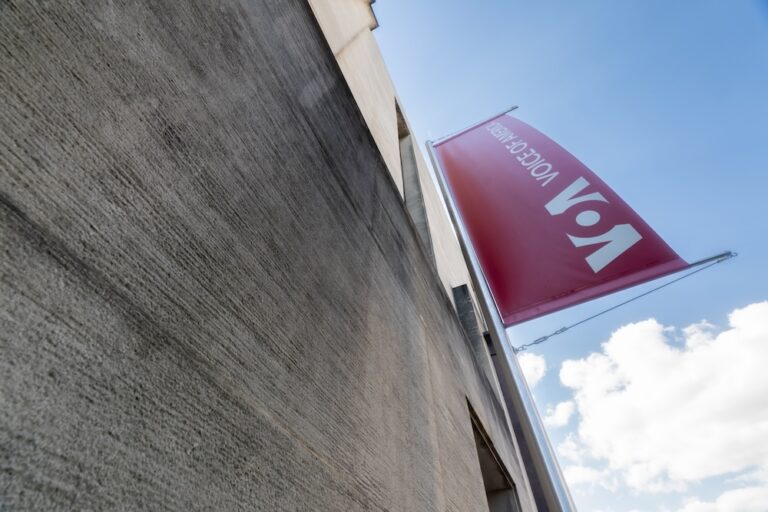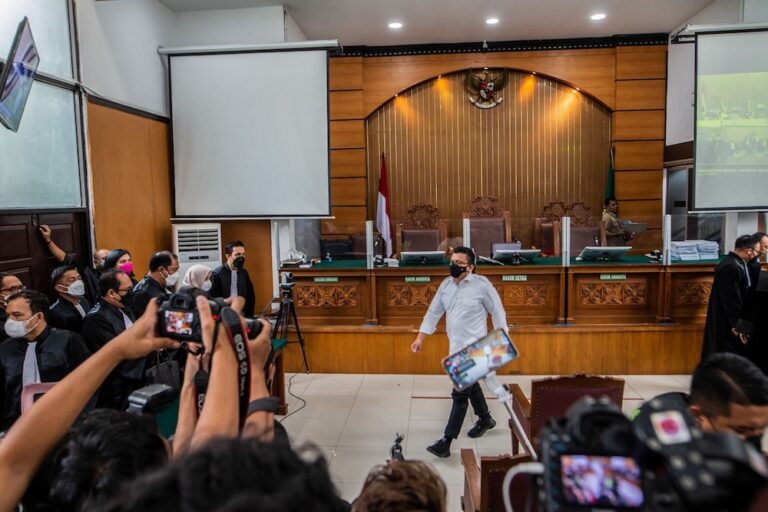(AJI/IFEX) – AJI is noting that, apparently, the press freedom currently flourishing in Indonesia is still being obstructed by the mentality of government officials who seek to control and regulate the appearance of journalists. After the banning of three journalists from reporting in the grounds of the Attorney General’s Office – on grounds that they […]
(AJI/IFEX) – AJI is noting that, apparently, the press freedom currently
flourishing in Indonesia is still being obstructed by the mentality of
government officials who seek to control and regulate the appearance of
journalists. After the banning of three journalists from reporting in the
grounds of the Attorney General’s Office – on grounds that they were
impolite – journalists are now required to wear a peci (cylindrical Islamic
hat) while they are inside the state palace, President B.J. Habibie’s
workplace. The stated reason for this requirement is nationalism.
President Habibie’s aide, Col. (Pol) Firman Gani rebuked several cameramen
and photographers for not wearing peci while they were covering a meeting
between the United Nations Secretary General’s Special Envoy, Jamsheed
Marker, and Habibie in the State Palace on Monday, 21 June 1999. The aide
pursued the journalists, who had already left the meeting’s venue, and
shouted: “Imbeciles! You’ve already been told several times that you have to
wear a peci if you’re covering the president, so why aren’t you wearing one,
you stupid fools!” He told several cameramen, “You won’t be able to come in
either if you’re not wearing a peci!”
Since replacing president Soeharto in May 1998, President Habibie has made
it mandatory for all members of the Presidential Guard, officials and
ministers to wear peci. Now it appears that this requirement extends to
journalists who report on events taking place in the State Palace daily.
Many journalists have eventually acquiesced, even though they don’t agree
with the requirement. Habibie has linked the wearing of a peci to the
journalists’ nationalism.
On Tuesday, 22 June, a “courtesy” incident occurred between “Tempo”
journalist, Ali Nur Yasin, and the Minister of Trade and Industry
(concurrently head of the Logistic Bureau), Rahardi Ramelan. When Ali Nur
Yasin tried to confirm an issue with Rahardi, he was rebuked. “Who invited
you, do you think I invited you here!”, Rahardi stated. Apparently, Rahardi
was still fuming about a “Tempo” story – which appeared in edition 21-
detailing the behaviour of Tumbu Astiani, Rahardi’s wife, and the suspicions
that she had transferred money out of the country. In this week’s “Tempo”
edition, Tumbu is reported to have carried three suitcases containing
between US$280, 000 and 400 billion rupiah (approx. US$60 billion).
According to AJI, the incidents involving the attorney general, the state
palace and Rahardi, demonstrate that government officials still consider
journalists and the media to be subordinates whom they can regulate and
control as they please. Furthermore, journalists cannot seek confirmation
without being invited to do so beforehand. AJI suggests that the measure of
journalistic courtesy is not found in the kind of clothes and ties worn or
in the wearing of a peci. Officials’ habit to look down upon and intimidate
journalists ruled supreme during the Soeharto era, and journalists and the
media bowed to it. However, in the present era, when conditions have
changed fundamentally, the mentality of officials has remained the same.
As a result, AJI is appealing to:
1. Government officials to cease using contrived reasons purely to control
journalists.
2. Indonesia’s journalists to remain independent and refuse to back down in
the face of all manner of intimidation and pressure applied by government
officials.
3. Indonesia’s journalists to remain faithful to ethics, remain critical in
their tasks and to reject all attempts to meddle in their work practices.


